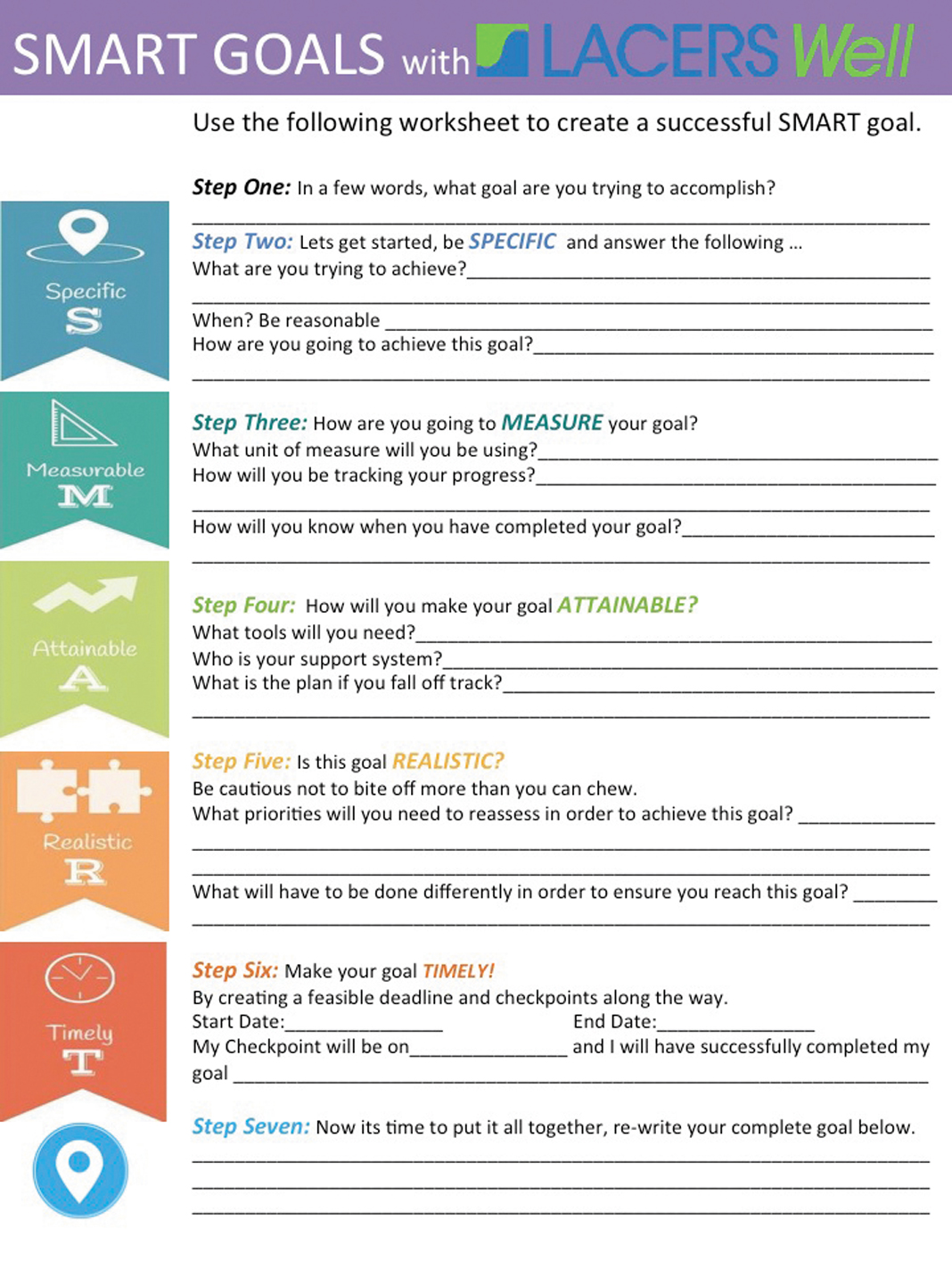By Tara Miller, RD/N LACERS Well Program Manager, and Candace Wilkie, Wellness Intern
Goal setting can be exciting, motivating, terrifying and inspirational. It is a universally helpful tool for future planning, and imperative for making a much-needed change in one’s life. So why do some goals fall flat and others soar? Are some people just programmed or genetically engineered to be successful in their goals?
Not necessarily. Goals, even deeply meaningful ones, can fall short of their potential for a variety of reasons, including:
- A lack of a support system
- Unrealistic time or emotional investments
- Poor belief in the overall success or capability to follow-through
- Lack of accountability
- Impracticable deadlines and/or a failure to include personal consequences
Although often attributed to personality traits like pure willpower, resolve or even grit, most goals require more than discipline to succeed and to be maintained. In fact, studies show that if “smart” goal setting — which stands for Specific, Measureable, Attainable, Realistic, and Timely – is utilized, your odds of meeting or even surpassing your goals significantly increase by illuminating possible barriers, true motivation, and likely outcomes. Instead of relying on perceived “should,” including “I should quit smoking,” and habitual “wishes,” like “I wish I were a size 2,” the “smart” process involves applying an honest and thoughtful lens to map out goals. When evaluating your goal, consider if it is (or can be), the following: PRINT FORM

Specific
A goal that is specific clearly defines who’s involved, how it will be achieved, and in what time frame.
Example: Each January, Alice vows to “exercise more” but has never been successful at maintaining her program. This year, Alice created a more specific goal by planning to exercise one day a week (Mondays), at 10 a.m., in her favorite Zumba class for three months with her best friend, Joy, who goes on a regular basis.
Measureable
Includes units of measure (where applicable) and a reliable way to track progress.
Example: Robert is always tired and gets frequent headaches. He knows he should drink more water, but since he is so busy, he doubts he’ll be able to keep track of how much he drinks. To assist with this, he makes a goal to drink two additional glasses of water per day (12 oz. total) for two weeks, and keeps a log of his efforts at his desk, which he checks daily before clocking out.
Attainable
Will this goal be a priority? Was it created for personally meaningful reasons? What resources will you need to achieve success?
Example: JoAnn’s doctor has indicated that weight loss would be beneficial to her health, but until her recent diagnosis of diabetes, JoAnn didn’t think much about it. Sensing her concern, her doctor offers a referral for a nutritional consult and information on local exercise facilities she can afford. Armed with these and her family’s positive encouragement, JoAnn believes she can achieve this goal and is excited to get moving. She agrees to lose 10 pounds by her next month’s appointment.
Realistic
Are your abilities and skill set a good match for this goal? Are the resources you identified above available to you now?
Example: Mike wants to run a 5K that is six months away. He has never been a strong runner but is otherwise in good shape. To be successful, Mike must be able to run for 45 consecutive minutes. Since he already walks 30 minutes on the treadmill each week, Mike knows that he can progressively switch walking with running, in 10-minute increments each month, and build up to the full 45 minutes of running in a six-month timeframe.
Timely
A practical time frame addresses possible conflicts with current responsibilities. Is this a short-term goal or a long-term goal? Is the deadline fixed or flexible? Have benchmarks been included for self-evaluation?
Example: Maggie scheduled a trip to Ireland in May and wants to improve her health and energy level to make traveling more enjoyable. Although she’d like to go to the gym more often, she knows this is an unrealistic expectation during the upcoming tax-season. Instead, Maggie decides to focus on improving her nutrition habits by having healthy snacks on hand (at the office and at home), and switching to water instead of diet soda. In one month, after evaluating her results, Maggie includes a 20-minute walk after lunch most days. By May, Maggie has lost 15 pounds, and feels great!
By using “smart” goals, you can often sidestep unforeseen barriers that are bound to creep up, and discover a bit about yourself along the way. To see how “smart” your goals are, check out the LACERS Well online featured challenge at www.LACERS.org/lacerswell.











